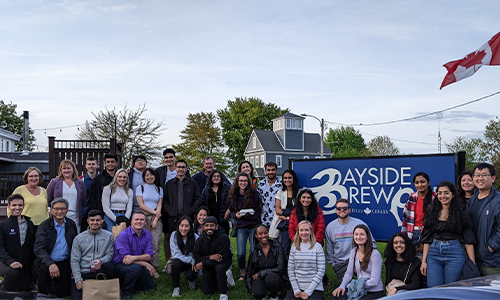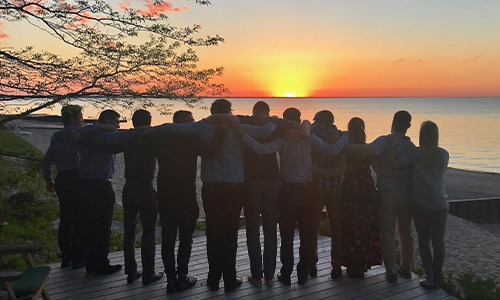Discovery Week: 25 years of life and practice in regional Ontario
By Cam Buchan
For 25 years, medical students at Schulich School of Medicine & Dentistry have “discovered” first-hand what life and medical practice in regional Ontario have to offer through Discovery Week.
The first-of-its-kind mandatory program immerses the School’s budding doctors in communities from Owen Sound to Windsor for a full week at the end of first year. It is also a bright light in the desperate physician shortages faced by many regions in southwestern Ontario.
Since its beginning in 1998, Discovery Week has placed approximately 3,700 students in regional communities – many of whom eventually return to practise medicine in those very places.
 Rural communities map - Academies - Distributed Education - Western University (uwo.ca)
Rural communities map - Academies - Distributed Education - Western University (uwo.ca)
“So many of our students reference their Discovery Week experience when they start to map out their future path,” said Dr. George Kim, currently associate dean, Admissions at Schulich Medicine, who did his Discovery Week in Tillsonburg, Ontario. He most recently served as assistant dean, Distributed Education. “Our graduates overwhelmingly remember their Discovery Week experience – the patients they met, the health care workers, the community and how it embraced them. Getting a taste of life and medicine in a different community can be a defining factor in where they choose to be a doctor.”
This year, more than 170 students will be located in 29 participating areas.
“What Discovery Week does for our students after a year of study is reconnect them with why they came to medical school in the first place,” said Kim. “To this point, they have been ‘drinking from the firehose.’ But what better way to cap off first year than with the experience of seeing real people receiving real health care in real communities in southwestern Ontario.”
Student experiences range from visiting patients in a variety of health-care settings – emergency, urgent care, and inpatient care – to working with nurses, personal support workers, emergency medical services staff and community pharmacists. And of course, off-hours are used to immerse students in the community through participation in diverse local events, which showcase all it has to offer.
As a first-year MD student, Dr. Adam Fehr, MD’12, experienced Discovery Week in Chatham, Ontario, and later returned to the community as a general surgeon.
“Discovery Week is the first time you truly see what community medicine is really like,” said Fehr. “And because of my interest in general surgery, I really got to see what a general surgeon does. It was about discovering medicine outside of the academic side.”
Many, like Fehr, returned to the communities where they did their placements. Others, like Dr. Amita Dayal, MD’03, settled down in rural communities elsewhere in Ontario.
Immersed in the community
Dr. Amita Dayal, MD’03, went to Strathroy, Ontario, for her Discovery Week experience, which opened her eyes to the scope of family medicine in a rural community. She also spent two summers in Goderich, one spent reviewing student evaluations of Discovery Week, and then presented the findings at the Wonca Rural Medicine Conference in Australia.
“These rural experiences really opened peoples’ eyes to what family practice can be like,” said Dayal, who grew up in Scarborough and entered the University of Toronto’s Rural Residency Program in Family Medicine in Port Perry, north of Toronto, where she decided to start a practice and a family.
“Depending on the community, students see family doctors doing anesthesia work, coroner work, emergency room work, obstetrics and gynecology, and long-term and palliative care work,” said Dayal. “When I was in Strathroy, one day I’d be working with a family doctor in the office, and the next day, I’d have an emergency room shift.”
Even now, she has residents who tell her that the family medicine practice is very different than what they thought it would be.
“Sometimes people are turned away thinking it’s all office work and talking,” said Dayal, who grew up wanting to live in the country, and be an ‘old school family doctor who works in a small town and does everything.’ Two years ago, those two plans came together when Dayal bought a farm in the Port Perry area.
“When they see what we can do, how well we know our patients, and how immersed we are in the community, they understand how fulfilling family medicine can be.”
Transition point
Discovery Week is also a transition point where medicine stops being an academic pursuit and becomes real, said Dr. Ian Hons, regional academic director for Oxford County, whose duties include bringing students on board for Discovery Weeks in Woodstock, Tillsonburg and Ingersoll. Oxford County has hosted 148 learners since the program began.
“They see real, living patients in front of their eyes,” said Hons. “It’s a special time when you see what you’re learning and planning to do has real impact on real people to improve their lives.”
The experience also has a re-energizing effect on doctors who have a chance to share their knowledge and skills and interact with students both in the hospital setting and in the community.
“To remember when I was the medical student who thought he knew everything but didn't really know anything. It’s these kinds of experiences that stoke your passion to continue learning,” Hons said. “It gives you a lot in return. To interact with a keen learner and realize you have accumulated skills and knowledge to pass on, while engaging in the process of sharing that with the next generation, is very satisfying.”
The experience can also play an important role in determining a physician’s future direction, as Fehr explained.
“You do electives in third and fourth year and as a resident. If you went to a community and that community impressed you, you start planning ahead for electives in those communities,” he said.
The challenge
Discovery Week has also helped meet a very real need in finding physicians for Southwestern Ontario, said Hons and also Jan McKague-Weishar, recruitment officer for Listowel Wingham Hospitals Alliance, in Listowel and Wingham
“Across Oxford County in nearly every community, you’re going to see a new subdivision going up,” said Hons. “At one point, we had an estimate in Woodstock that approximately 20,000 people didn’t have a physician or were geographically isolated from their physician, which is to say they had moved from somewhere else.”
Hons recalled when he opened his family practice in 2021, his waitlist was full within 12 hours. Demand for other services, such as paediatrics, orthopedics, surgery, and anesthesiology, is also growing.
“It’s kind of desperate times.”
McKague-Weishar noted how much their communities have grown, leaving many people without physician care. Programs like Discovery Week have an effect, she said. But the seed planted can often take a while to sprout.
“We’d take more students if we could, but the reality is we only have so many physician preceptors,” said McKague-Weishar, who has hosted approximately 120 Discovery Week students between Listowel and Wingham.
McKague-Weishar outlined the challenges faced in communities like Listowel and Wingham. She noted there are 21 physicians in Listowel and Wingham with nine approaching retirement age.
“Combine that with the current physician supply, and it’s really overwhelming and kind of scary,” she said. “We have programs like Discovery Week and students come and they're excited about medicine and they're going to be future physicians, which energizes us and gives us hope.”
Supporting the future
Retired portfolio manager and a member of multiple boards, Keith Graham holds a deep connection with both Schulich Medicine and the Chatham community where he lives.
Graham’s father, Alexander, came to Canada from Scotland and went to medical school here at Schulich Medicine, and practiced for a time in Chatham, where Graham grew up. Now Graham and his family have established two funds: One for scholarships with a focus on supporting first-year students from the Chatham-Kent area, and the other on supporting community programs like Discovery Week.
“A lot of these students may come from big cities and have never lived in a smaller community,” said Graham. “I think the idea of exposing them to rural communities is a very important thing. One of the things that attracts me to Schulich is its focus on rural medicine and growing the number of doctors in these communities.”
Graham, too, finds hope in programs like Discovery Week.
“They are always a very impressive group – bright-eyed and energetic and ready to take on the world,” he said. “That gives me hope because they will be playing an important role in our health care system, and that’s very exciting for me.”
“We’re so grateful to collaborate with regional partners who welcome our medical students and give them unparalleled first-hand training experiences in their communities,” said Kim. “Working together, we’re creating a cohort of physicians who are ready, willing and able to care for people across Ontario in a variety of settings.”













